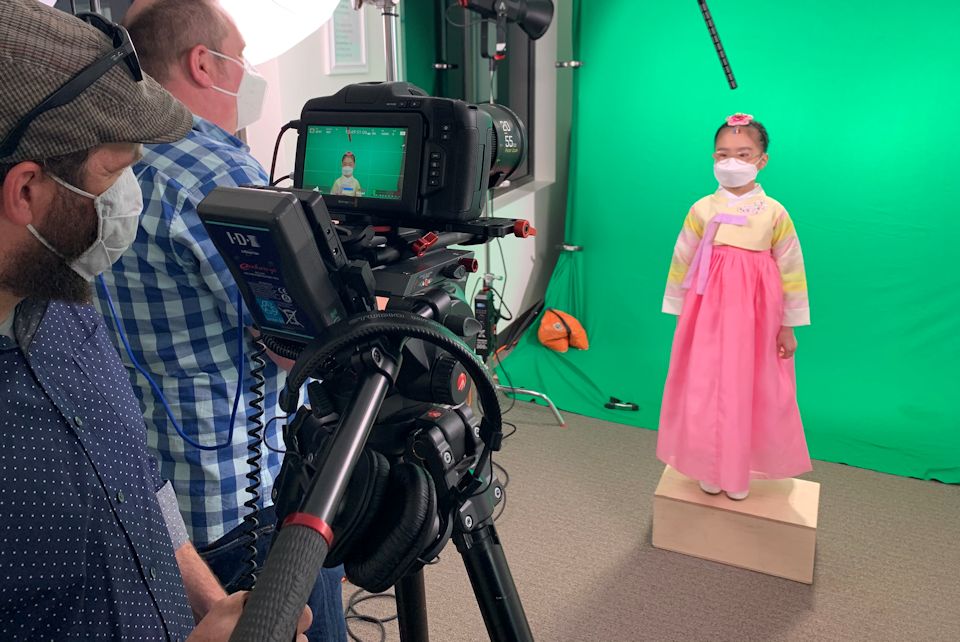Pastor Jonathan Mays, Greensky Hill Indian UMC, and Pastor Anna Moon, TroyHope UMC, led the Michigan Annual Conference in beginning and ending the day with worship on June 4.
GLENN M. WAGNER
Michigan Conference Communications
June 4, 2021 | LANSING — Friday worship celebrated the cultural diversity within the Michigan Conference family of God. A Native American and a Korean congregation brought spiritual uplift to members and friends of The Michigan Annual Conference.
Opening worship with Greensky Hill Indian UMC
A virtual annual conference offered a blessed opportunity on Friday morning to take a video road trip to the Greensky Hill Indian United Methodist Church just east of Charlevoix, MI to hear the music of our faith in a different language and to listen to the honest laments over injustice past and present that have not dimmed with time.
The ministry of the Greensky Hill Church traces back to the leadership of Peter Greensky, a Chippewa Indian who preached the gospel of Jesus Christ to his Indian brothers and sisters. In 1860 Greensky was put in charge of the Indian Pine River Mission near Charlevoix, serving there until his death in 1866. A simple log church was built at the mission in the 1840s surrounded by trees marking the site of a long sacred Native American meeting place. Today the church is used by an active, racially mixed congregation, some of whom are descendants of the original worshipers.
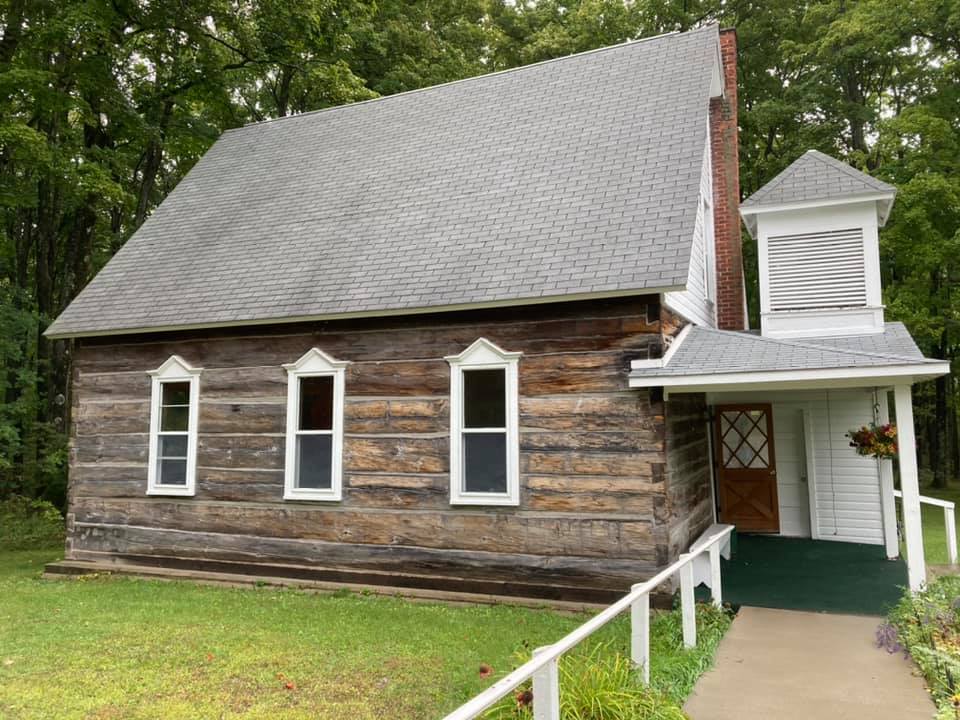
Greensky Hill’s current Pastor, the Rev. Jonathan David Mays, relates additional history of the church. “Our stories tell us that a couple of hundred years ago, 25 years or so before Peter Greensky and the congregation arrived on the shores of Susan Lake in Charlevoix, 29 or 30 Ogimaas (leaders/heads of family groups) gathered in this place held sacred by first peoples. As a sign of peace with one another, they each planted a tree in a big circle (or concentric circles), bending each young tree so that it would grow into a crooked tree. Crooked trees were used to mark trails and sacred places. Bending the trees also protected them from the timber industry. As the trees in the original circle began to age and fall, Greensky Hill members planted a new circle of trees in our active cemetery near our hewn-log sanctuary and Susan Hall. Those trees, though not bent, are now mature and a reminder of new life and unity at Greensky Hill. Seven original crooked trees remain standing in the original Circle of Trees calling us to our ancestors’ commitment to peace and connection with creation.”
After a brief introduction by Bishop David Bard, the opening worship service took members into the historic church, with music accompanied at times by native drums and flute. The worship was capably led by Rev. Mays, members of his congregation including: Jonathan’s wife of 43 years and partner in ministry, Kathy Mays; Sharon Osterhouse, accompanist and family farmer; Laurie Wilson-Moore a descendant of one of Greensky Hill’s founding families; Edward Oliver, son of a noted Greensky Hill historian; Sarah Shaeffer, Youth and Family Pastor at Greensky Hill and her singer-song writer sister Jessica Dominic, both members of the Little Traverse Bay Bands of Odawa Indians and members of a family that played a key role achieving federal recognition of the sovereignty of Indian bands in Michigan; and Matt Koontz, a student of the Anishinaabemowin language, accomplished flute maker and player, and Spanish teacher at Petoskey High School.
In scripture, liturgy, song, and prayer worshippers were invited to remember the exile of Jews to Babylon after the fall of Jerusalem in 586 BC. Scriptures preserving the pain of that dislocated generation were shared. Psalm 137 and Lamentations 3 were read and the difficult context was remembered.
It is hard to sing the Lord’s song in a new land. Real pain is not easily dismissed. Difficult as it is, truth-telling and difficult listening are both required for healing to take place. Our ancestors in the faith preserved laments because honest laments are an honest way to express real grief. There is no lasting peace without justice. Artfully, Jonathan David Mays in his sermon set the words of biblical laments in context before linking them with current events and the contemporary laments of artists like John Legend and Common, Kimberling Latrice Jones, and Native American Hip Hop Artist Supaman.
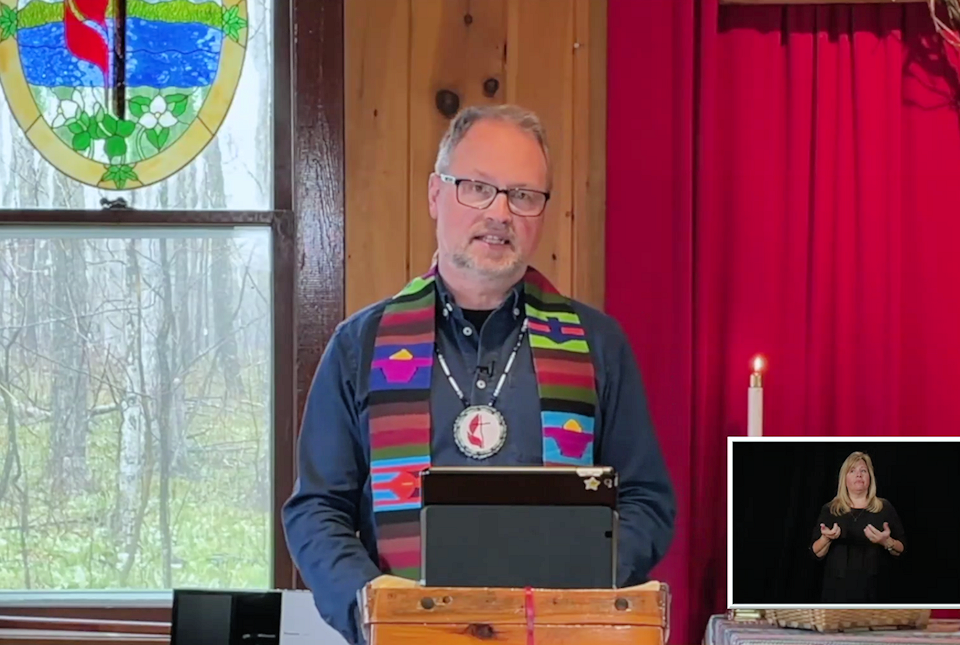
Pastor Mays did not shy away from hard truths when he shared:
“Like myriads of broken treaties between white power systems and indigenous people, Jones laments,
You broke the contract when you killed us in the streets… You broke the contract when for 400 years, we played your game and built your wealth. You broke the contract when we built our wealth again on our own by our bootstraps in Tulsa and you dropped bombs on us, when we built it in Rosewood and you came in and you slaughtered us. You broke the contract.
“Latrice Jones laments the consequences of those broken contracts and concludes, ‘And they are lucky that what black people are looking for is equality and not revenge.’” Mays noted, ‘That’s a hard pill. I thought long and hard about taking on Psalm 137 in all of its expressions during Annual Conference worship.”
Mays encouraged the conference with this conclusion to his message.
“It is a legitimate and important part of this process to get to Lamentations 3:22 & 23.
But this I call to mind, and therefore I have hope: The steadfast love of the LORD never ceases, [God’s] mercies never come to an end; they are new every morning; great is your faithfulness.
“Have mercy, Loving God, and teach us to lament with our most vulnerable kin, in their language, so that we might truly, madly, deeply understand the steadfast love of your kingdom. … How shall we sing the Lord’s song? By first listening, really listening, to the Lord’s song in everyone else. By hearing and recognizing the voice of Christ in every song. Every human. Every people. Every song. … It could be good.”
The worship concluded appropriately with a hymn of prophetic hope for a new day for all of God’s people, “Let Justice Like Waters Roll Down.” The final verse declared hope:
O may we flow freely like waters and streams
to heal and restore broken hearts and lost dreams.
Awaken us fully to all we can be,
reclaiming our souls as we set people free.
It was a privilege to be welcomed into this sacred space and to worship in the language spoken in Michigan before the French and English arrived. This worship experience was made even more powerful by the video segments filmed outside the church in scenic Northern Michigan lakeside settings.
Pastor Jonathan Mays’ parting comment on his way out of the church at the end of the service is a hopeful call to action: “Let’s go! We’ve got a world to love!”
Afternoon worship with TroyHope
Late on Friday afternoon, the Michigan Annual Conference concluded a day of virtual reporting and learning with another opportunity to celebrate the diversity of God’s people and continuing reflection on what it means to “Sing the Lord’s Song.” In introducing worship leader Anna Moon, Bishop David Bard said of the TroyHope congregation: “The congregation started in November 1972 with eight people worshiping and, by the grace of God, the congregation is over 1000.”
The TroyHope Ministry website offers additional introduction:
TroyHope Ministry is an English-speaking ministry affiliated with the Korean United Methodist Church of Metro Detroit in Troy, Michigan. Our congregation is a multicultural mix of God-loving people from our local communities, extended communities, and from all around the world. Some are from right next door, others were born overseas or live in or have come from elsewhere in the United States. All are welcome in our doors. “Breaking news, people” – You do not have to be of Korean descent to join with us. While we are affiliated with a Korean Church, more than one-third of our congregation are not of Korean descent at all. We believe this is how church should be. We’d like to see you and to meet with you, no matter your ethnicity, no matter your wishes and wants in life… we are all the church of Jesus Christ. Come… be a part of this with us. Let us rejoice in the Lord together.
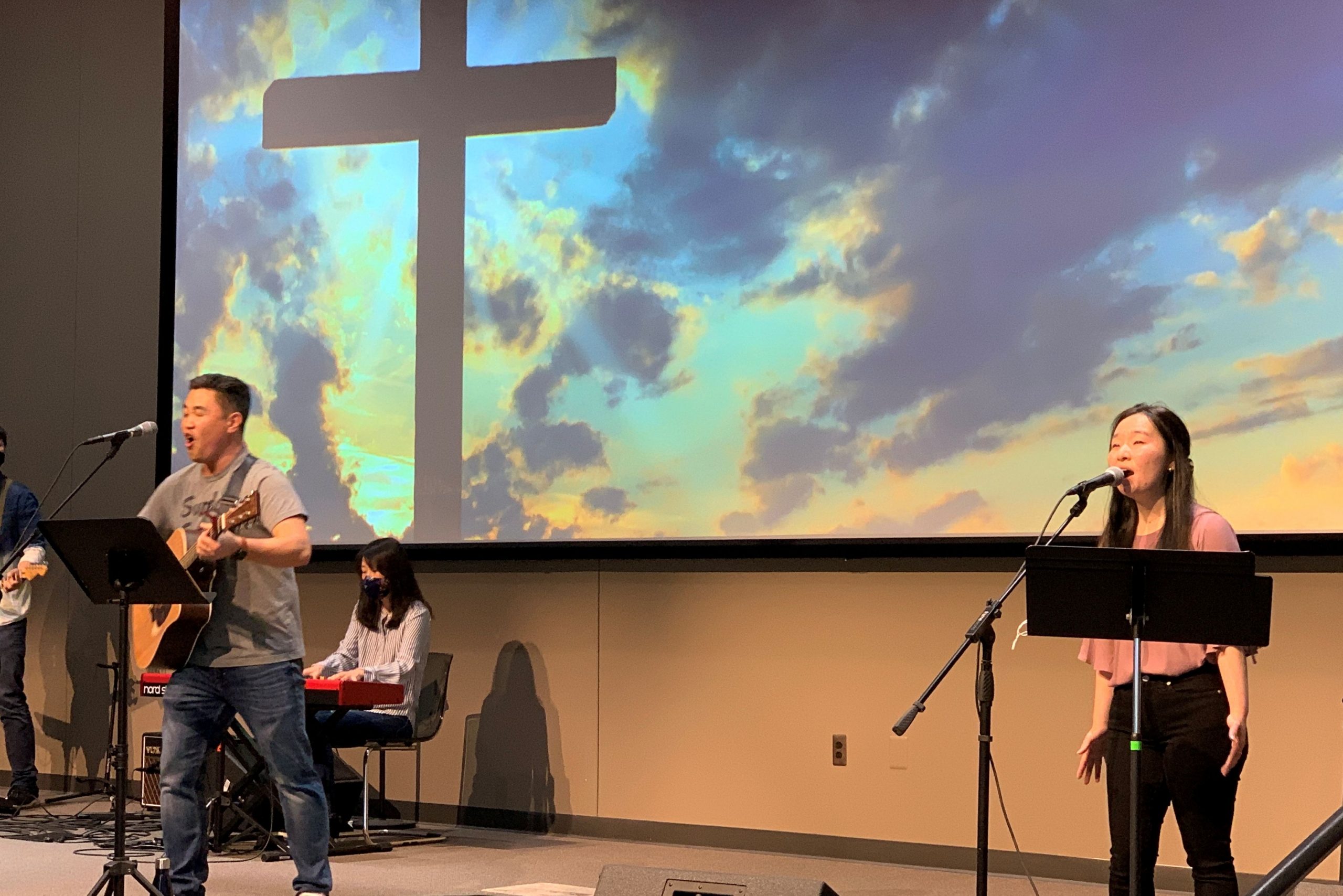
The praise team from TroyHope United Methodist Church joined the Rev. Anna Moon in singing the Lord’s song on Friday, June 4, 2021. ~ mic photo/Aaron Word
Virtual worship opened with Rev. Anna Moon welcoming worshipers into TroyHope’s contemporary worship space. The congregation’s seven-member praise team joined her in joy-filled song.
An opening prayer was offered by the Rev. Eugene Paik. Eugene is one of the First Kwansonims (Exhorted Deacons) at TroyHope and serves as treasurer of COAAM, the Committee on Asian American Ministry of the Michigan Conference. He was one of the signers of the call for prayer issued by the COAMM against the evils of anti-Asian racism on March 19, 2021 following the March 16 shootings of Asian Americans in Atlanta. Eugene prayed: “Please help us to keep your perspective at heart and lead us at this time to seek you for wisdom and discernment. There is still much to be done in following your great commission. There are many around us who haven’t found you or heard of the hope that we have in you. This hope that you provide, aids us, heals us, and convicts us. The hope in you that makes us a light in this world. Lord please keep us focused on your calling.”
Prayer was followed by an offering of scripture read by children of the church from Psalm 137 and Revelation 7 in multiple languages. Leo Brocht set the context in English sharing from the Jews in Babylonian exile over 500 years before Christ who expressed their grief in Psalm 137. He then read the heavenly vision penned by the exiled Apostle John who described the throne room of God in his Revelation on the Island of Patmos around 96 CE.
How could we sing the Lord’s song in a foreign land?
After this, I looked, and there was a great multitude that no one could count, from every nation, from all tribes and peoples and languages, standing before the throne and before the Lamb, robed in white, with palm branches in their hands.
They cried out in a loud voice, saying …
In progression, the remembered words of the peoples gathered before God’s throne from Revelation were declared in languages from the TroyHope Community.
Yeji Kim shared in Korean from Revelation 7:10b words that were translated,
Salvation belongs to our God who is seated on the throne, and to the Lamb!
The same words of praise were shared by Lucas Chue in Mandarin.
Isaac Chue repeated the praise in Cantonese.
Leo Brocht declared the same in English.
Salvation belongs to our God who is seated on the throne, and to the Lamb!
The multi-language reading reminded worshipers that God’s glory translates into all the languages on earth.
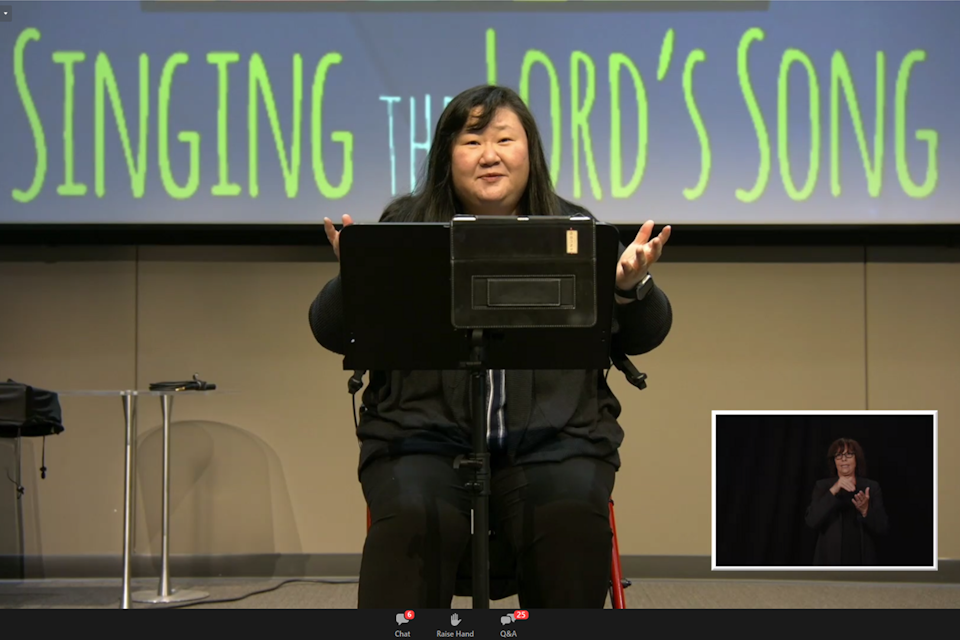
Pastor Anna Moon shared her sermon on “Singing the Lord’s Song in a Strange Land,” offering insights from her personal spiritual wrestling with the text of Psalm 137.
She shared the feeling of many worshipers across The Michigan Conference when she reflected: “This has been a strange time of doing worship online. Before, we were trying to get people inside the sanctuary, but now we are trying to keep our distance to show our love. How we miss being with one another, and how we miss hugging and having food fellowship and singing with one another with one full voice.”
“First, Singing the Lord’s song in a strange land is about remembering where we are from, who we are, and whose we are. … We remember the first home God created and it was very good. In God’s plan, our home was to be where the Creator God has created for the creations to be living in peace in the Lord God and with one another.”
Pastor Moon spoke powerfully to the recent hate crimes against Asian Americans in Georgia where her parents live, and in New York City where a hate crime was perpetrated on an Asian woman on a busy street in broad daylight and no one bothered to help. She contrasted hate with examples of love and acceptance that she has experienced. Moon talked about the pervasive nature of sin, the divisiveness of hate, and noted, “Jesus physically came down to this strange, foreign land teaching us to sing the Lord’s song so we can remember whose we are, where we are from and where we are headed!! Jesus teaches us to sing the Lord’s song and let our lives be songs to the Lord as we have marks of Jesus Christ so others will know that we are his disciples.”
Anna continued with a strong second point about the singing of faith in a challenging time. “Singing the Lord’s song in this strange or foreign land is about looking forward to our true home! The preacher shared the powerful inspiration she received from attending a global conference of praise for Christ with a full arena of people while she was attending the University of Illinois at Urbana. There she experienced the joy that comes from unity of praise in the global body of Christ. She proclaimed that celebrating God in our difference but also our unity is God’s plan and it is up to us to live into this vision.
Pastor Moon’s third point described the Christian’s true home. “Singing the Lord’s song in this strange or foreign land is about living out our home here on this strange or foreign land as citizens of the Kingdom of God.”
Anna was honest about her personal challenges with her own physical health concerns. She has learned from her congregation, her colleagues in ministry, and her faith in Christ to stay focused on Christ’s desires for us.
She concluded by remembering again God’s vision from Revelation for all the peoples of the world.
So, let us continue to live as the kingdom people; loving God, loving one another as one body of Christ, as we act justly, love mercy and walk humbly with our God as we sing the Lord’s song in this strange land.
For Salvation belongs to our God who is seated on the throne and to the Lamb!! Blessing and glory and wisdom and thanksgiving and honor and power and might be to our God forever and ever! Amen.” (Revelation. 7:10, 12)”
The closing words of benediction were offered in Korean by Rev. Eung Yong Kim, Senior Pastor of Troy Korean United Methodist Church. Rev. Kim also serves as the President of the Michigan Conference Korean Caucus.
살아계신 하나님 오늘 귀한 말씀을 통해 우리가 주님의 나라를 다시 보게 하시니 감사합니다. 구원하심이 오직 주님께만 있음을 고백합니다. 함께 예배한 모든 형제와 자매들에게 하나님의 크신 은총을 더해 주셔서 놀라운 주님의 일하심과 역사하심 가운데 있게 하옵소서. 날마다 우리에게 힘주시고 귀한 길로 인도하시는 성부와 성자와 성령의 이름으로 축복하며 기도합니다.
The English translation reminds us that God’s love helps us with our differences:
Living God, thank You for allowing us to see Your kingdom again through Your precious Word today. We confess that salvation belongs to only You, Lord. We pray for God’s great grace being added to all who worshiped together to be in the midst of Your presence and all Your amazing work. In the name of the Father, the Son, and the Holy Spirit who blesses, strengthens, and leads us in precious ways daily. Amen!
Last Updated on October 31, 2023

